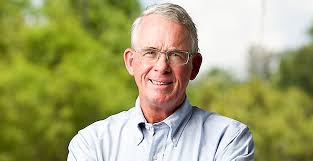By Ryann Lynn, Environment Florida, and Francis Rooney, U.S. Congress
It’s no secret that people come to Florida for the ocean. We may be the Sunshine State, but there is no better place to enjoy that sun than standing near the water. The combination of white sand beaches and crisp breezes, while watching the sunset dip below the horizon with the sound of the calming waves is the essence of Florida.
No doubt, people have moved to Florida for decades eager to enjoy crystal clear springs, colorful coral reefs, lush parks, and pristine beaches. But while our beautiful coastal landscapes and diverse wildlife warrant our neighbors’ envy, Florida’s idyllic natural spaces are being increasingly threatened by human activities. If we can take steps to conserve these places, particularly our ocean, the environment will help protect itself.
While we think of hurricanes as a natural phenomenon, they are stronger and more frequent than they once were because of the industrial world we’ve created and its reliance on fossil fuels.

Hurricanes build from more than 2,000 meters below the surface. Since 1970, the water temperature at these depths has soared in large part because atmospheric carbon dioxide levels are higher today than at any point in the past 800,000 years. As a result, Floridians are bracing for larger, slower, wetter storms — storms that can cause more destruction.
Recently Peter Gaynor, the administrator for the Federal Emergency Management Agency (FEMA), supported the link between climate change and intensifying storms. His position reflects the growing scientific consensus that global warming is beginning to have real impacts on our weather.
For Floridians, building a more resilient future all starts with protecting the sea we love. Free from pollution and fossil fuel-induced temperature rises, a healthy ocean can help mitigate some of the worst impacts of the climate crisis. Its miles of mangroves and seagrass beds act as carbon sinks, which are much-needed storage for our ample emissions.
Seagrass stabilizes the seafloor, helping to reduce shoreline erosion and keep water clear. Beyond that, the health of our ocean is vital because more than two-thirds of the oxygen we breathe comes from marine plants.

Simply put, protecting the ocean is essential to our state’s future.
Despite this, our actions continue to damage this essential natural resource. While our society’s continued reliance on fossil fuels is the largest culprit of greenhouse gas emissions causing temperatures to rise, it’s not the only threat to our ocean.
Our clean water infrastructure is aging, leading to sewage spills. Agriculture runoff continues to lead to more algal blooms, such as the red tide outbreak we experienced in 2018.
Matters may get even worse as there is a looming threat of proposed oil drilling. Plastic also continues to pile up in our waterways and filter into the ocean. Each of these acts adds fuel to the fire, endangering the waterways and marine life we rely on.
Thankfully, many of our residents and local governments are working to protect our ocean. Surfers, swimmers, and environmental activists are organizing beach clean-ups and educating their communities on why the ocean is so special. Local organizations and city officials are looking for ways to protect our water from plastic pollution.
Even with these efforts bigger change is necessary because our ocean and, as a result, our state, remain vulnerable. Every Floridian who has experienced hurricanes, rising sea levels, and extreme temperatures know this. These changes are already affecting public health, harming our way of life, and endangering our food supply.
Tackling the climate crisis is essential for Florida’s health and economy. As the state with the second most coastline, the Florida delegation has a responsibility to protect our ocean. Floridians, including those in Congress, must prioritize ways to protect seagrass and mangroves from plastic and nutrient pollution; reduce sources of greenhouse gas emissions; and address problems with aging infrastructure.
Without those efforts, what makes Florida so special may be lost forever.
Ryann Lynn is the Climate and Clean Energy Advocate for Environment Florida. Francis Rooney, a Republican, represents Florida’s 19th District in the U.S. House.
“The Invading Sea” is the opinion arm of the Florida Climate Reporting Network, a collaborative of news organizations across the state focusing on the threats posed by the warming climate.



